State Budget 2025: RM1,200 pocket money for S’wakian students studying in higher learning institutions

KUCHING (Nov 11): Sarawakian students studying in higher learning institutions across the country will receive pocket money of RM1,200 next year. Premier Datuk Patinggi Tan Sri Abang Johari Tun Openg said this special financial assistance will benefit 25,000 Sarawakian students from families of lower income groups with household per capita income of RM1,500 or below per month. “The money given is to be spent on food and essential goods to help them mitigate the cost of living. “Under this Budget, a sum of RM30 million will be allocated for this purpose,” he said when tabling the State Budget 2025 at the State Legislative Assembly (DUN) Sitting here today. Abang Johari said the RM500 book vouchers and free laptop for Sarawakian students initiatives, which were launched in August this year, will also be continued in 2025. “A sum of RM2 million will be allocated for the book vouchers where RM500 is allocated per person for public and private higher-learning institutions Sarawakian students for households with per capita income of RM1,500 per month and below. “The free laptop assistance to Sarawakian students who have successfully enrolled into public and private higher-learning institutions for households with per capita income of RM1,500 per month and below will empower our students with the essential technology they need to excel in their academic pursuits with an allocation of RM30.5 million next year, which will benefit 10,166 students,” he said. He also said that the Sarawak government will continue to provide annual operating grants to state-owned universities and colleges where for 2025, a sum of RM35 million will be allocated to University Technology Sarawak, RM30 million to Sarawak Skills Development Centre, RM30 million to i-CATS University College, and RM5.5 million to Kolej Laila Taib. Other allocations under the State Budget 2025 to enhance Sarawak’s education system and facilities included an allocation of RM20 million for the Sarawak Education Enhancement Programme (SEEP), a joint free tuition initiative for Form 4 and 5 students in core subjects Science, Mathematics, English and History as well as pure science subjects, with an expansion in the programme’s coverage; RM4.6 million for the teaching of Science and Mathematics in English (Dual Language Programme); and RM27 million to cover the operation cost of three state-owned international schools in Petra Jaya, Mile 12 Kuching-Serian Road, and Sibu, the latter of which is scheduled to be completed by the end of this year. Under the early childhood sector, Abang Johari said RM20 million will be allocated to state-owned early childhood provider SeDidik, and a sum of RM14 million for the annual special grant to all registered early childhood and care institutions in 2025. “To ease the burden of parents, an allocation of RM2.5 million will also be allocated next year for Tadika and Taska fee subsidies. “This will benefit 2,500 children whose parents’ monthly income is RM7,000 and below. By providing this assistance, we aim to increase Sarawak children’s access to early childhood education,” he said.
Premier: B40 housing proposal underscores inclusivity in Kuching’s urban development

KUCHING (Nov 10): The Sarawak government plans to allocate a land in Kuching to be developed into affordable housing for the B40 (low-income) group. Premier Datuk Patinggi Tan Sri Abang Johari Tun Openg highlights this as underscoring the government’s commitment to integrating the B40 group into Kuching’s urban development. “We do not want those who are unable to afford houses to be pushed outside of Kuching, to live in distant areas. “Our policy is one of inclusivity; regardless of social status, all citizens should live together. “For the B40 group, the government must provide the necessary assistance for them to acquire houses,” he said during his speech for Sarawak Housing and Real Estate Developers Association (Sheda)’s Excellence Awards 2024, held at the Borneo Convention Centre Kuching (BCCK) on Saturday night. Adding on, Abang Johari emphasised the importance of providing affordable housing in the urban areas to the B40 group, which would allow them to enhance their livelihood. “If B40 families reside near quality educational institutions, it will offer a better future for their children. “By 2026, if their children are eligible for university education at Sarawak-owned universities, we will cover their university fees. “This initiative will elevate our fellow Sarawakians, equipping them with knowledge so they can pursue any career of their choice and improve their livelihoods,” he explained. On another subject, Abang Johari announced that the state government would allocate land for the construction of new Sheda headquarters. He added that the proposed headquarters building would be located alongside those other professional bodies such as the Institution of Engineers Malaysia (IEM), the Bumiputera Engineers Association, and the Board of Surveyors and Town Planners. “We have allocated land to these professional organisations, so the Sheda headquarters should ideally be in the same vicinity.” Abang Johari also said a cluster for professional organisations was being planned within the Kuching area, which would feature enhanced connectivity. “This area will include a new route extending from the rear of Unimas (Universiti Malaysia Sarawak) to Pending, eventually linking to the Sejingkat Bridge. The route is expected to be ready by late 2025 or 2026. “With this new route, the area will be effectively integrated into Kuching, with just a 20-minute drive to the city centre. “The Sheda headquarters will be located there,” he said.
RM321 mln Batang Rajang Bridge to be completed by March 2025

By DayakDaily Team SARIKEI, Nov 8: The RM321 million Batang Rajang Bridge is expected to be fully completed by March next year, two months ahead of schedule. Deputy Premier of Sarawak, Datuk Amar Douglas Uggah Embas, who is also the Minister of Infrastructure and Port Development (MIPD), expressed his satisfaction with the project’s progress during a stitching ceremony for the bridge at the site today. “This project marks a milestone that will drive regional connectivity,” he said as quoted by Sarawak Public Works Department (JKR) in a Facebook post today. The bridge is expected to reduce dependence on the existing Sibu-Tanjung Manis Road and provide a shorter route between these areas. The bridge’s completion will see a reduction in the journey between Sarikei and Tanjung Manis from 122 kilometres (km) to 53km with travel time cut short from 2 hours and 30 minutes to 45 minutes. Meanwhile, for the journey from Bintangor to Tanjung Manis, the travel distance will be reduced from 108km to 60km, cutting down the travel time from two hours to one hour only. Also present were Deputy Minister for Urban Planning, Land Administration and Environment Datuk Len Talif Salleh, who is also Kuala Rajang assemblyman; MIPD permanent secretary Datu Chew Chee Yaw; Pakan assemblyman Tan Sri William Mawan Ikom; Meluan assemblyman Rolland Duat Jubin; Sarikei Resident Datu Michael Ronnie Langgong and Sarawak JKR acting director Wisil Lichok. DayakDaily
Sarawak plans to open trade and tourism office in Abu Dhabi
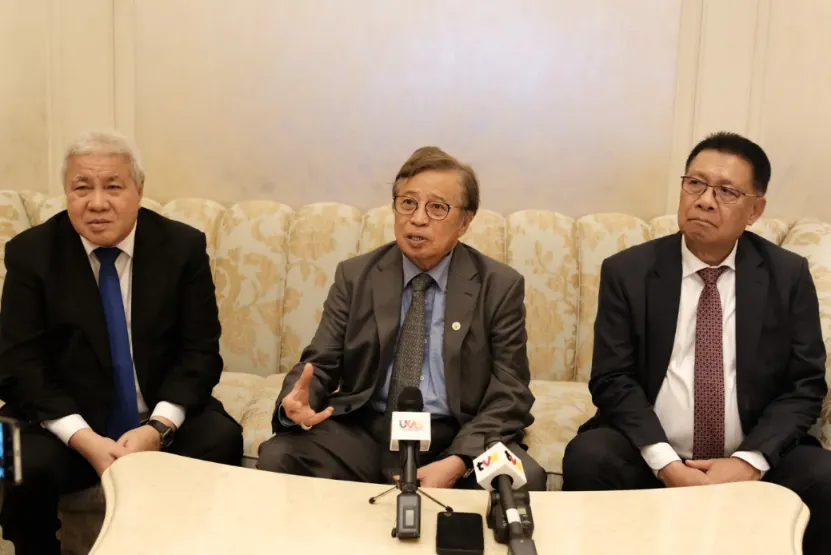
By DayakDaily Team ABU DHABI, Nov 6: The Sarawak government is planning to open a Sarawak Trade and Tourism Office in Abu Dhabi, United Arab Emirates (UAE) as part of its efforts to strengthen strategic cooperation with the country. According to a report by Sarawak Public Communications Unit (Ukas), Sarawak Premier Datuk Patinggi Tan Sri Abang Johari Tun Openg said that a suitable location for the office in Abu Dhabi is still being identified. If the plan materialises, he said the office will be managed by Petroleum Sarawak Berhad (Petros) and Sarawak Energy Berhad (Sarawak Energy). “The office placement plan also aims to enhance cooperation with countries in the Middle East and other ASEAN regions, as well as share technology with Abu Dhabi. “Abu Dhabi already has a data centre powered by renewable energy through solar, and they have partnerships with investors. “If we find compatibility between the Middle East and us, there is potential at the ASEAN level to foster close cooperation between the Middle East and Asia,” he said during a press conference following his visit to Masdar City, Abu Dhabi, on Tuesday (Nov 5) as part of his working visit to the UAE. Also present were Sarawak Deputy Premier Datuk Amar Awang Tengah Ali Hasan, Minister of Utility and Telecommunication (MUT) Dato Sri Julaihi Narawi, Sarawak Secretary Datuk Amar Mohamad Abu Bakar Marzuki, Deputy Minister of Energy and Environmental Sustainability (MEESty) Datuk Dr Hazland Abang Hipni, Deputy Minister of Urban Planning, Land Administration and Environment Datuk Len Talif Salleh, and Sarawak Energy Group Chief Executive Officer (CEO) Datuk Sharbini Suhaili. Additionally, the Sarawak Premier noted that the Sarawak office in Abu Dhabi would function similarly to the Sarawak Trade and Tourism Office Singapore (STATOS), the Sarawak Trade and Tourism Office Brunei (STATOB), and the Sarawak Trade and Tourism Office Kalimantan. – DayakDaily
Sarawak’s Kuching city to emulate UAE’s Masdar City as development model

By DayakDaily Team ABU DHABI, Nov 6: The advancements of Masdar City in Abu Dhabi will serve as a model for the future development of Kuching, particularly in new areas. According to a report by Sarawak Public Communications Unit (Ukas), Sarawak Premier Datuk Patinggi Tan Sri Abang Johari Tun Openg emphasised the importance of adopting the carbon-free city as a model for sustainable development, featuring cutting-edge technology. “We see the potential to learn from the sustainability practices of this city and use it as a model for the development we aim to implement in Kuching, especially in new areas. “I believe we can adopt what has been successfully executed in Masdar City. We will discuss this further and perhaps explore collaboration with Abu Dhabi,” he said during a visit to Masdar City in Abu Dhabi on Tuesday (Nov 5), as part of an official working visit to the United Arab Emirates (UAE). Joining him were Sarawak Deputy Premier Datuk Amar Awang Tengah Ali Hasan, Minister of Utility and Telecommunication (MUT) Dato Sri Julaihi Narawi, Sarawak Secretary Datuk Amar Mohamad Abu Bakar Marzuki, Deputy Minister of Energy and Environmental Sustainability (MEESty) Datuk Dr Hazland Abang Hipni, and Sarawak Energy Berhad (Sarawak Energy) chairman Datuk Ibrahim Baki. During the visit, the delegation observed the use of new technology powered by solar energy, featuring low-carbon initiatives and a balance in environmental conservation. “They utilise solar energy, and the city’s infrastructure is built around sustainable and eco- friendly practices. “I noticed that the development here prioritises high standards of environmental conservation, focusing on low carbon emissions and incorporating advanced educational, commercial, and administrative facilities,” he stated. He further said that the sustainable city model developed by Abu Dhabi could transform Sarawak’s development landscape toward greater sustainability. At the same time, he envisioned potential cooperation between Sarawak and Abu Dhabi in exploring new economic opportunities. During the visit, Abang Johari and his delegation had the opportunity to ride the Personal Rapid Transit (PRT), a driverless electric autonomous vehicle. They also received a briefing from Suwaid Al Badi, Head of Procurement and Contracts at Masdar City, on the city’s development. Also present were Petroleum Sarawak Berhad (Petros) chairman Tan Sri Datuk Amar Hamid Bugo, Sarawak Economic Development Corporation (SEDC) chairman Tan Sri Datuk Amar Abdul Aziz Husain, Sarawak Energy Group Chief Executive Officer (CEO) Datuk Sharbini Suhaili, and other senior Sarawak government officials. DayakDaily
No more ‘quota system’ for admission to Sarawak state-owned universities
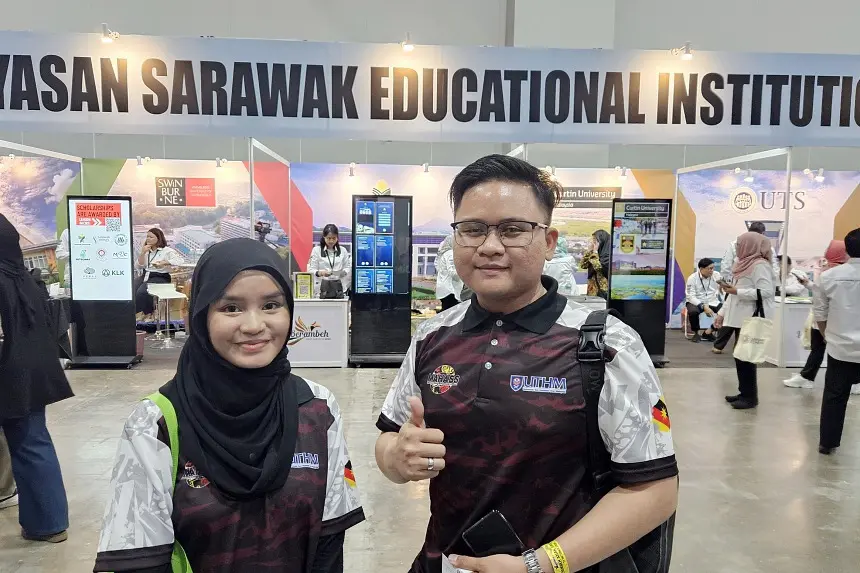
SIBU – Admission into five state-owned universities in Sarawak will be based solely on meritocracy to pick the best of the best, said Dr Annuar Rapaee, the Malaysian state’s Deputy Minister of Education, Innovation and Talent Development. “Students need to know that enrolment for these universities is no longer based on a quota system. In other words, it’s based on meritocracy,” said Dr Annuar at the Sarawak Career and Training Fair 2024 on Nov 2. He said that with a system of meritocracy, students have to compete for places. “Students must realise the importance of competition in order to pursue their studies in university,” he added. The five universities are Swinburne University of Technology Sarawak Campus, Curtin University Malaysia, University of Technology Sarawak, i-CATS University College, and Centre for Technology Excellence Sarawak. According to Dr Annuar, for Sarawak to advance towards becoming a developed state, meritocracy is the “only way to train talents and pick the best of the best among our students”. To ensure that rural students can gain admission to these universities, he said the Sarawak government is upgrading their facilities, which includes spending RM15 million (S$4.5 million) yearly to provide free tuition for Secondary 3 and 5 students. THE STAR/ASIA NEWS NETWORK
Premier: Sarawak laying groundwork for future financial success aligned with environmental stewardship
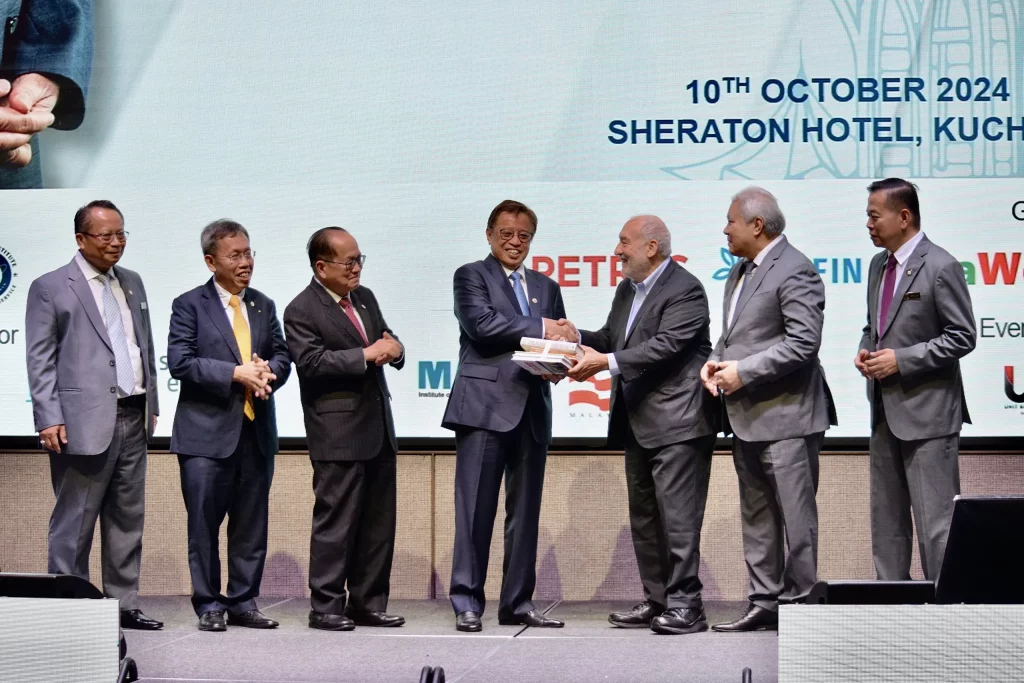
KUCHING (Oct 10): Sarawak is transitioning towards a green economy that prioritises sustainable development while minimising environmental degradation, said Datuk Patinggi Tan Sri Abang Johari Tun Openg. The Premier said this shift focuses on decoupling economic growth from carbon emissions and resource depletion, ensuring long-term economic and ecological resilience. “Sarawak is laying the groundwork for a future where financial success is aligned with environmental stewardship by integrating renewable energy sources such as hydropower, solar, and biomass,” he said in his keynote address at the Sarawak Future Forum here today. Noting that while Sarawak was historically reliant on oil, gas, and timber, Abang Johari said the state’s economy is now diversifying in response to the global shift towards low-carbon economies. “Recognising the finite nature of these traditional resources, the state is pivoting toward renewable energy, digital innovation, and human capital development. “The Post Covid-19 Development Strategy (PCDS) 2030 serves as a roadmap for this transformation, embedding environmental sustainability as a fundamental component of economic progress,” he said. He pointed out that a cornerstone of Sarawak’s economic transformation is its commitment to renewable energy. “With substantial hydropower capacity, the state already leads the region in clean energy production. “However, Sarawak is expanding its renewable portfolio, targeting an impressive 15GW capacity by 2035. This strategic expansion positions Sarawak as a regional powerhouse in green energy, capable of exporting sustainable power to neighbouring countries, including Singapore, Indonesia, and beyond,” he said. He also said that green hydrogen is at the forefront of Sarawak’s clean energy strategy where the state aims to become a key exporter of hydrogen, particularly to South Korea and Japan, aligning with their national net-zero strategies. “Furthermore, Sarawak is developing a robust hydrogen transportation and storage infrastructure, allowing for seamless export to international markets. “By leveraging its geographical advantage and proximity to key Asian economies, Sarawak can become a major supplier of clean hydrogen, further diversifying its economy,” he said. On Sarawak’s digital transformation, Abang Johari said this extends to urban development, where the region invests in smart city initiatives to optimise city management and improve residents’ quality of life. “Artificial Intelligence (AI) and the Internet of Things (IoT) are being integrated into infrastructure systems to enhance efficiency in areas such as traffic management, energy distribution, and public services. “These smart city initiatives are not just about improving urban living—they are also aligned with Sarawak’s broader climate goals. “By making cities more efficient and sustainable, Sarawak is reducing its environmental footprint while enhancing the liveability of its urban areas,” he said. The Premier said the principle of inclusivity also lies at the heart of the Sarawak government’s development strategy. “Social equity must be a guiding principle as we develop policies and programmes that ensure every Sarawakian, regardless of background, has access to opportunities for education, employment, and entrepreneurship. “To truly measure our success, we must ask ourselves, ‘Are we creating a society where everyone has a chance to succeed? Are we building a future where no one is left behind?’ These are the questions that must guide our work in the years ahead,” he said. On the forum, Abang Johari said the inaugural event has brought together global experts, thought leaders, and practitioners from diverse fields, including Nobel laureate Prof Joseph Stiglitz, a global leader in economic thought who has long championed the need to move beyond gross domestic product as a measure of success. “It is our hope that through these discussions, we will gain new perspectives and insights on how to create a more just and sustainable economy. “Sarawak is ready to learn, to adapt, and to lead in areas that matter most to the future of our planet – whether it be green energy, renewable energy, sustainable agriculture, or digital innovation,” he said. The Sarawak Future Forum is organised by the Sarawak Centre of Performance Excellence (Scope) and Leadership Institute of Sarawak Civil Service (LISCS), in partnership with The New York Times, Institute of Management Sarawak (Masa), and the American-Malaysian Chamber of Commerce (AMCHAM). Among those present were Deputy Premiers Datuk Amar Douglas Uggah Embas, Datuk Amar Awang Tengah Ali Hasan, and Datuk Amar Dr Sim Kui Hian; State Secretary Datuk Amar Mohamad Abu Bakar Marzuki; and Deputy State Secretary (Economic Planning and Development) Datu Dr Muhammad Abdullah Zaidel.
Lee: S’wak drawing up master plan on integrated, modern transport system
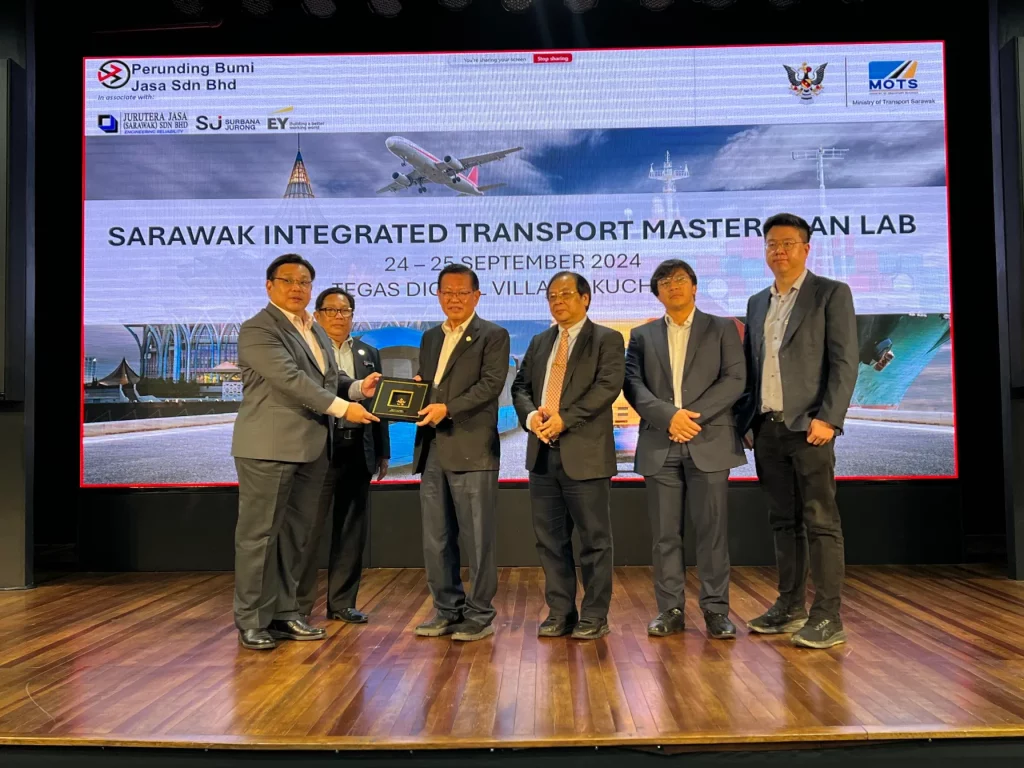
KUCHING (Sept 24): The Sarawak Integrated Transport Master Plan 2025-2040 aims to create a comprehensive framework to develop an integrated and modern transport system that meets the evolving needs of Sarawak, said Dato Sri Lee Kim Shin. The Transport Minister said while there have been various city master plans and regional development plans in the past that touched on the aspects of transport, none have fully consolidated or addressed the complexity and opportunities within the sector. “This Master Plan aims to address that gap and chart a unified and strategic way forward,” he said when officiating a lab session for the master plan here today. He said the transport sector serves as the backbone of Sarawak’s economy and social inclusivity, where it plays a pivotal role in supporting key industries such as manufacturing, agriculture, tourism and services. He pointed out that his ministry has embarked on a transformative transport development including initiatives to modernise the public transport system under the Kuching Urban Transport System (KUTS) as well as enhancing air connectivity through the establishment of a Sarawak-owned airline and plans for a new international airport, which can unlock Sarawak’s potential as a strategic air travel hub and serve as a gateway for greater economic and tourism growth. “In the maritime and riverine sector, Sarawak is blessed with an extensive network of rivers which presents opportunities for trade, tourism and industrial growth including the oil and gas industry. “The Sarawak Transport Ministry is committed to leveraging these resources in an environmentally sustainable manner,” he said. He also said that the logistics sector had also been discussed, with a focus on developing lorry terminals to streamline supply chains across land, river, and air transport. “We are not only looking at developing transport in Sarawak only; we are working towards sub-regional connectivity with our neighbouring countries, Brunei Darussalam and Indonesia as well as regionally to promote sustainable economic growth, cross-border trade and tourism. “As we progress with the development of the transport modes – land, river, sea and air – we need to embrace digitalisation to improve efficiency, enhance integration and meet sustainability goals such as the use of green fuels and energy,” he said. Lee urged the lab participants, which comprised representatives from 56 government agencies and the private sector, to actively engage themselves throughout the session, which will also explore legal frameworks necessary for implementing the initiatives. “Your insights are of utmost importance in crafting a practical Master Plan,” he said. He also extended his appreciation to the study’s consultant consortium companies comprising Perunding Bumi Jasa, Surbana Jurong, Ernst and Young, Jurutera Jasa and Reddit & Co, for taking up this important task in the development of the Master Plan. “Your expertise and dedication will help ensure that the plan is comprehensive, sustainable, forward-looking and practical to provide a blueprint that can be effectively implemented,” he said. Also present were Deputy Minister of Transport (Aviation and Road) Datuk Dr Jerip Susil, Perunding Bumi Jasa Sdn Bhd director Wan Alwi, Surbana Jurong director Dennis Tan and Jurutera Jasa director Felix Ang.
Premier: Miri Port to propel northern Sarawak’s economy, rival Dubai after 2030
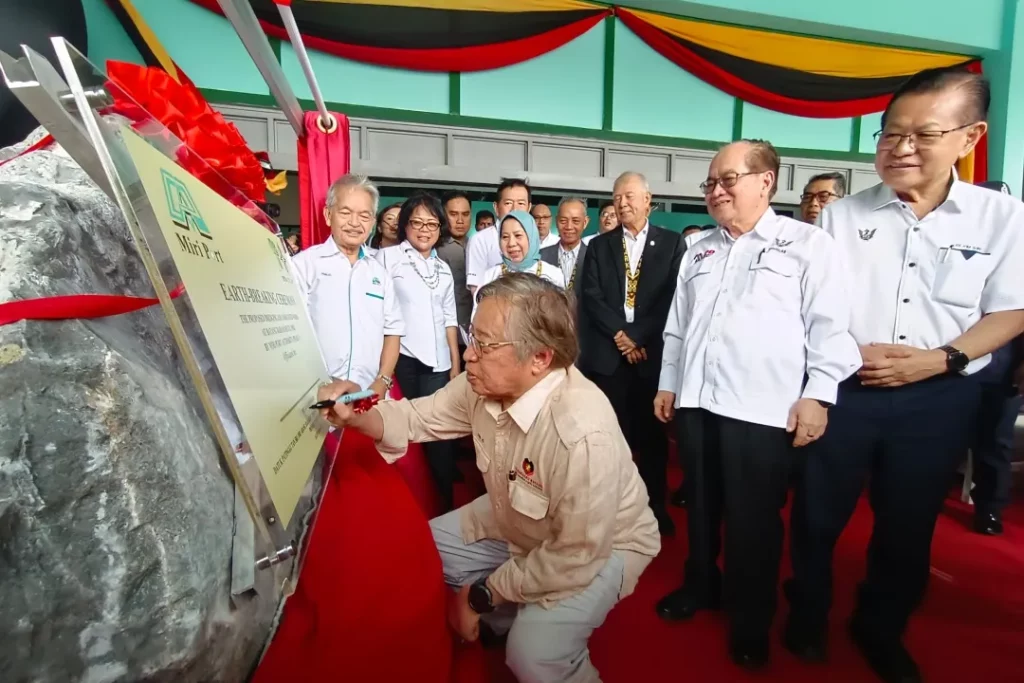
MIRI (Sept 18): The Miri Port has the potential to become a key port linking Sarawak’s northern trade to global markets, said Sarawak Premier Datuk Patinggi Tan Sri Abang Johari Tun Openg. He said apart from that, it can spur economic opportunities and further accelerate development in Sarawak’s northern region, including the hinterlands. “The people of Miri have long dreamed of developing this port. However, the high costs and questions over its economic feasibility kept it on hold for years. “Datuk Amar (Douglas Uggah Embas) and his team met with me to discuss the project, and I had already considered the idea, as we had always wanted to build a port in the northern region but the path forward was unclear,” he said. Abamg Johari was speaking at the groundbreaking ceremony of the proposed RM208.9 million training bund and dredging project at Batang Baram Delta, at the Miri Port here today. Abang Johari said that the dredging project to deepen the access channel would adopt the latest BREEAM (Building Research Establishment Environmental Assessment Method) technology which is already used in developed countries in Europe. “Hence, we set aside an allocation amounting RM280 million even when the cost is only RM208 million. We are putting aside the remaining funds for future projects,” he added. He noted that the investment will return to Sarawak over time given the vast potential and opportunities the project brings after its completion by year 2026. Looking forward to the future, Abang Johari envisioned Miri Port not only able to handle various types of cargo, but also be turned into a resort that would attract tourists, potentially competing with the world’s renowned tourist destination like Dubai. “If this area becomes a resort, it could be a rival to Dubai. They have the Palm (Jumeirah), so our port will not only welcome cargo and vessels, but also cruises that bring in tourists. “We will build buildings, hotels there. With that, we will have a major port that is on par with Singapore,” he said, adding that this would be materialised after 2030. Additionally, he said the Miri hinterland, which is rich in palm oil, would also benefit greatly from the port as transportation costs would be reduced, resulting in higher profit margins. He said that the Baram Delta has also been identified as a Carbon Storage area, creating opportunities for the Carbon Capture, Utilisation, and Storage (CCUS) industry. He added that the port would also feature containerisation facilities, further boosting its capacity to handle a variety of cargo. “As for our pipeline, Sarawak will manage its own gas resources. Our gas resources are our right, despite some issues with Petronas at the moment. This means that we will develop a state gas roadmap including here in Kuala Baram, and this is one of the new industries,” he said. He stressed that for Sarawakian to enjoy these developments, the people must remain united and support the Gabungan Parti Sarawak (GPS). “As long as GPS is here, we will continue to have new ideas, which we call innovation where we constantly look for ways outside the box to develop Sarawak,” he said. Meanwhile, Abang Johari witnessed the formal exchange of contract documents between Miri Port Authority and its joint venture partners Rimbun Prima Sdn Bhd and China Communications Construction Company (M) Sdn Bhd. Also present at the function were Deputy Premier Datuk Amar Douglas Uggah Embas, Transport Minister Dato’ Sri Lee Kim Shin, Deputy State Secretary (Economic Planning and Development) Datu Dr Muhammad Abdullah Zaidel, and Miri Port Authority chairman Datuk Paulus Palu Ngumbang.
Sarawak’s rapid growth, lofty plans should not be seen as desire for independence: Premier Abang Johari
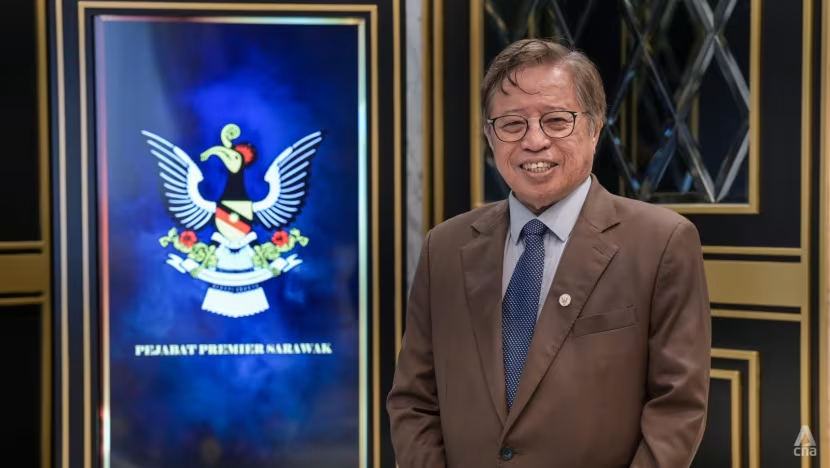
Led by Premier Abang Johari Openg, Sarawak is making moves to cement its status as one of Malaysia’s most important states and has likened itself to the economic powerhouse region of Bavaria in Germany. KUCHING: In a lounge on the highest floor of the Wisma Bapa administrative building near downtown Kuching in Malaysia’s Sarawak state, the walls are black and marble with ornate gold trims. The floor is fully carpeted, the ceiling boasts chandeliers, and sofas line every corner of the spacious room. The lounge is part of the office of Sarawak’s Premier Abang Johari Openg, a key figure in the autonomous state. Stacked on coffee tables are news magazines outlining Mr Abang Johari’s achievements and grand ambitions for Sarawak, which has massive oil and gas reserves and is well on track to have its own port, airline and financial institution. And these grand plans have given the Premier the confidence to tout his state’s prowess and positioning in Malaysia as similar to the Bavaria region in Germany – known as an economic powerhouse there. In recent years, Sarawak has retaken Bintulu Port from the federal government, bought over regional airline MASwings from the national flag carrier Malaysia Airlines, and is in the final stages of acquiring a controlling stake in Affin Bank. These moves are necessary for Sarawak to “go forward”, while the state’s riches mean it can afford to give back to its people, Mr Abang Johari said in a wide-ranging interview with CNA in August. In December 2023, he unveiled a plan to provide free tertiary education for Sarawakians in state-owned universities from 2026. The idea of free tertiary education for Sarawak natives was first mooted by Mr Abang Johari as part of his birthday wish in August 2022. “For any country to develop, you need quality human resources, and that is where I think with good education behind them, you can get people out of poverty,” he told CNA at Wisma Bapa. “It is more so when you have the economic ecosystem that allows them to make use of what they know to develop further.”

